|
|
|
Sort Order |
|
|
|
Items / Page
|
|
|
|
|
|
|
| Srl | Item |
| 1 |
ID:
119432
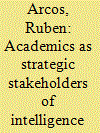

|
|
|
|
|
| Publication |
2013.
|
| Summary/Abstract |
The political changes occurring since the end of the Cold War have led to a rethinking of the structures and procedures of national intelligence systems. Policies of openness and interaction regarding these systems' external elements are becoming increasingly important. At the same time, business, non-profit, and governmental organizations in general have become aware of the need to manage relationships with their stakeholders if they want to succeed in accomplishing their missions.
|
|
|
|
|
|
|
|
|
|
|
|
|
|
|
|
| 2 |
ID:
119430
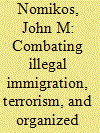

|
|
|
|
|
| Publication |
2013.
|
| Summary/Abstract |
During the 1990s the immigration problem in Greece began having explosive dimensions due to not only political and economic developments in southeastern Europe, but also to continuing conflicts in the Middle East and North Africa. An important factor which played a relevant role in shaping these developments was the 1991 collapse of Ramiz Alia's regime in Albania and the subsequent flow of illegal immigrants into Greece from Albania and other Balkan states (mainly Serbia, Romania, Bulgaria, and the Former Yugoslavia Republic of Macedonia-FYROM) due to the political unrest that took place in the region during that period.
|
|
|
|
|
|
|
|
|
|
|
|
|
|
|
|
| 3 |
ID:
119427


|
|
|
|
|
| Publication |
2013.
|
| Summary/Abstract |
Although the role of intelligence services has been addressed in many recent discussions of the democratization process, yet it has not yet generally been pursued sufficiently by academics and politicians. 1 Mongolia and its intelligence services have been among those countries undergoing a democratic transition and consolidation process. Mongolia is the only formerly Communist Asian state whose democratization process has not regressed. In fact, since 1990, electoral democracy has become the "only game in town," where space for a vibrant civil society exists, and the security institutions have remained outside of the political and economic contests. 2 Approval in early 2012 of the law on conflicts of interest, a set of laws concerning the judiciary, revisions of the election law, and a sustained public demand for good governance are signs of a healthy nascent democracy, one which admittedly still has room for improvement. 3 Unique in the region, Mongolia's security organizations-the military, intelligence agencies, and police-have remained mostly outside of this political transformation. The role of these security institutions in the quest for democratization has often been ignored because of a misperception about their roles and centrality, and the reality of the Soviet military presence in Mongolia during the Cold War.
|
|
|
|
|
|
|
|
|
|
|
|
|
|
|
|
| 4 |
ID:
119428


|
|
|
|
|
| Publication |
2013.
|
| Summary/Abstract |
Intelligence may have a bright future. Advances in imagery and signals processing technology mean that intelligence agencies can deliver remarkably accurate and timely intelligence to civilian officials and military commanders. However much leaders gripe about intelligence, few are likely to disregard such fine-grained information about threats and opportunities, especially when national security is on the line. Others contend that intelligence is central to the kind of wars that the United States is likely to fight in the foreseeable future. Counterterrorism, for example, depends on intelligence agencies to provide detailed descriptions of terrorist organizations, warning of impending attacks, and precise targeting information for offensive actions. U.S. counterterrorism operations will persist long after the country draws down from Afghanistan, because of the geographic expansion of groups associated with al-Qaeda, and because of the growing enthusiasm for special operations forces (SOF) and unmanned aerial vehicle (UAV) strikes against them. 1 Most importantly, policymakers have invested lavishly in intelligence for over a decade. President George W. Bush called for a large increase in the intelligence personnel in the wake of the 11 September 2001 (9/11) attacks on New York City and Washington, DC. Later, Congress created the Office of the Director of National Intelligence (ODNI), adding a new layer of bureaucracy above an already sprawling constellation of agencies. And, despite a great deal of criticism, the budget for intelligence has more than doubled since 9/11 and continues to rise.
|
|
|
|
|
|
|
|
|
|
|
|
|
|
|
|
| 5 |
ID:
119434


|
|
|
|
|
| Publication |
2013.
|
| Summary/Abstract |
At ten o'clock one night in early June 1963 my telephone rang. Calling was the camp commander of the Cuban Admissions Center (CAC) in Opa-Locka, Florida, where every Cuban male arriving in the United States was required to go for debriefing.
The commander asked me to come in early the next morning. He explained that two Cuban students had arrived in Florida by small boat. They said they had very important information to report, and he asked me to debrief them. He thought I was the best one to do so as I was the only one in the camp who had lived in Cuba and could best verify or debunk their story.
|
|
|
|
|
|
|
|
|
|
|
|
|
|
|
|
| 6 |
ID:
119433
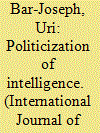

|
|
|
|
|
| Publication |
2013.
|
| Summary/Abstract |
The mistaken October 2002 National Intelligence Estimate of Iraq's weapons of mass destruction (WMD) capabilities, 1 and the claims that it was biased by political pressures, again brought to light the issue of the politicization of analytical intelligence products in democratic states. Top-down politicization is usually defined as "the manipulation of intelligence to reflect policy preferences." 2 More precisely, it is any external intervention in the elements of intelligence work which should be kept objective, autonomous, and free of political influence. Included are three stages of the intelligence process-collection, processing, and production-as well as certain elements of the planning, direction, and dissemination stages, which should be carried out solely on the basis of professional considerations. "External intervention" implies that politicization can be done not only by politicians but also by other consumers of the intelligence product, such as military officers and diplomats.
|
|
|
|
|
|
|
|
|
|
|
|
|
|
|
|
| 7 |
ID:
119431
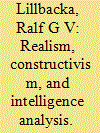

|
|
|
|
|
| Publication |
2013.
|
| Summary/Abstract |
The current rapid expansion of Intelligence Studies 1 is being driven by an increased need for intelligence in an unpredictable post-post Cold War world 2 that features complex operational contexts requiring special expertise, 3 private contractors increasingly performing core intelligence functions, 4 and intelligence missions expanding into completely new fields such as humanitarian action. 5 These trends, unlikely to be reversed in the immediate future, create a demand for the academic training of personnel in growing and diversifying intelligence communities. This will in turn generate an inherent pressure to further establish Intelligence Studies as a separate academic discipline. Not surprisingly, the hitherto fruitless search for a "theory of intelligence" has been rekindled. 6 Considering developments in adjacent disciplines, epistemological issues will, in all likelihood, increasingly come into focus. 7 Among them: What is "knowledge" in intelligence, and what counts as "true" or "justified" knowledge, if any?
|
|
|
|
|
|
|
|
|
|
|
|
|
|
|
|
| 8 |
ID:
119435


|
|
|
|
|
| Publication |
2013.
|
| Summary/Abstract |
Religion has seriously affected the gathering of intelligence since Biblical times. Beginning post-World War II with the rise of the state of Israel, however, religion began to become a direct political issue for the first time since the Middle Ages. The 1979 Iranian revolution brought this development to center stage, as practitioners of diplomacy were forced to study the interaction more carefully. The United States Intelligence Community (IC) understood some of this at the tactical level, but like the diplomatic community, has been slow to comprehend how fundamentally religion changes geostrategic considerations, hinders collection, impacts analysis, and changes the nature of covert operations, especially at the strategic level where politics, diplomacy, and intelligence intersect. To meet the challenge, the Intelligence Community and most statesmen need to develop much better understanding of religion's interplay with diplomacy among those at the upper levels who affect the direction of national policy.
|
|
|
|
|
|
|
|
|
|
|
|
|
|
|
|
| 9 |
ID:
119426
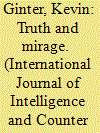

|
|
|
|
|
| Publication |
2013.
|
| Summary/Abstract |
In his 1967 novel, One Hundred Years of Solitude, Gabriel Garcia Màrquez wrote about the fictional town of Macondo as a place containing an "intricate stew of truths and mirages" where "God had decided to put to the test every capacity for surprise and was keeping the inhabitants … in a permanent alternation between excitement and disappointment, doubt and revelation, to such an extreme that no one knew for certain where the limits of reality lay." Garcia Màrquez later referred to Macondo as a "state of mind" more than any actual place, but the fictional town he created can be seen as somewhat representative of Latin America as a whole. Indeed, the recent history of Latin America comprises so many moments of "excitement and disappointment," so many highs and lows and so much "truth and mirage" that this region has fittingly given the world the distinctive literary style known as "magic realism.
|
|
|
|
|
|
|
|
|
|
|
|
|
|
|
|
| 10 |
ID:
119429


|
|
|
|
|
| Publication |
2013.
|
| Summary/Abstract |
The proper application of the principles of intelligence can enhance the performance of the private sector, improve the overall competitive situations of companies, and increase their decisionmaking capacities in increasingly complex and demanding global contexts such as the current international financial crisis.
|
|
|
|
|
|
|
|
|
|
|
|
|
|
|
|
|
|
|
|
|